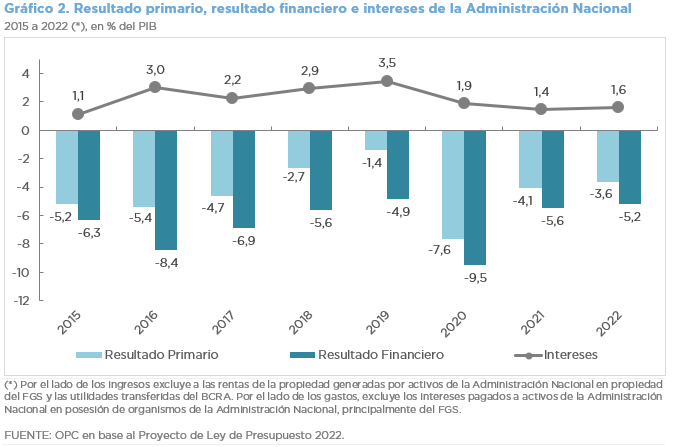The National Budget Bill for 2022 estimates GDP growth of 4%. If this dynamic were to be verified, GDP would exceed the pre-pandemic level in 2022, although it would remain 3.5% below the peak recorded in 2017.
The nominal exchange rate (NER) would stand at ARS102.4 per USD in December 2021 and ARS131.1 per USD in December 2022. This implies an increase in the real bilateral exchange rate.
- The Consumer Price Index will close at 45.1% this year and 33% in 2022.
- The trade surplus in 2021 will be cut by 27.6% because of the increase in imports. Calculations assume that foreign sales in the second half of this fiscal year will increase 37%.
- In the 2022 Budget Bill, revenues are expected to account for 16.7% of GDP, which would imply 1.0 p.p. less than that projected for the 2021 closing.
- It also provides for primary expenditures to represent 20.3% of GDP in 2022, which would imply a decrease of 1.5 p.p. with respect to the current fiscal year, driven by the contraction of energy subsidies (0.9 p.p.) and social programs (0.5 p.p.). On the other hand, capital expenditures would grow by 0.3 p.p. Including debt interest payments, total expenditures would account for 21.9% of GDP, implying a drop of 1.3 points compared to 2021.
- The dynamics between revenues and expenditures would result in an improvement in the primary, fiscal, and financial balances, which, despite this, would still be negative. The projected fiscal deficit for next year is 2.9% of GDP, the primary deficit is 3.6% and the financial deficit is 5.2%.
- Real direct investment will grow, including the construction of the Néstor Kirchner natural gas pipeline and the renovation of the tracks and corridor of the General Belgrano Cargas Railroad. Within the procurements of goods, the purchase of computer equipment, within the framework of the Juana Manso – Conectar Igualdad Federal Plan, stands out.
- It is projected to allocate ARS122.265 billion for the procurement of vaccines against COVID-19: 80 million doses to inoculate 40,975,941 people.
- In the Executive Branch, 5,873 new staff members are projected, including 2,245 positions in the Ministry of Security (38.2%).
- Of the 95 sections of the Bill, about 34 do not relate to specific budgetary matters and, therefore, should be the subject of other regulations.
- According to the Argentine Congressional Budget Office’s own projections, the current fiscal year would close with an additional expenditure of ARS375.809 billion, equivalent to 0.87% of GDP: 47.2% for higher estimated funds for Social Benefits and 23.9% for energy subsidies.

